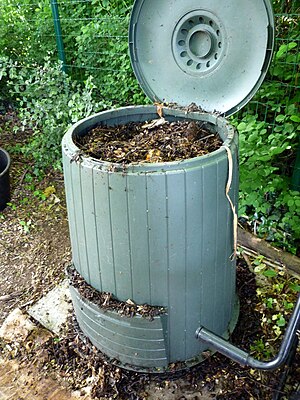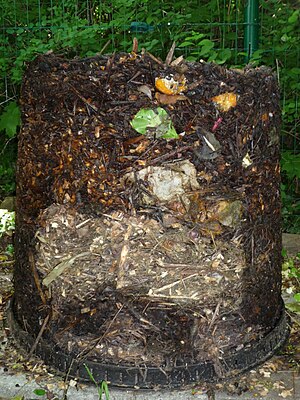 Image via WikipediaMost composts go dormant in the winter months and start-up again with the spring thaw and warmer temperatures. But if you live in a milder climate that does not get harsh winters, there is a way to continue to compost during the winter months.
Image via WikipediaMost composts go dormant in the winter months and start-up again with the spring thaw and warmer temperatures. But if you live in a milder climate that does not get harsh winters, there is a way to continue to compost during the winter months.You can create an insulated compost bin. Using a plastic garbage can, dig a hole big and deep enough to put at least six inches of the can underground. Use a natural insulating material such as straw and pack it around the base and up the sides of the can. Continue to compost as you would at any other time of the year.
Even though this method will still work in the winter months, the speed at which the material will decompose will still be slowed down. Winter composting will allow you to continue recycling your kitchen scraps throughout the colder months and you may even have compost at the beginning of spring to use in your garden.
 Image via WikipediaThe spring and fall are the best times to collect leaves to start a new compost bin. In the spring, the leaves you collect have already started to decompose as they stayed wet and insulated throughout the winter. It doesn’t matter though if you collect your leaves in either season – they are the perfect base for a new compost pile. If you are using dry leaves from the fall, consider putting them through a chipper of some kind. If they are smaller and already cut up it will aid in the whole composting system.
Image via WikipediaThe spring and fall are the best times to collect leaves to start a new compost bin. In the spring, the leaves you collect have already started to decompose as they stayed wet and insulated throughout the winter. It doesn’t matter though if you collect your leaves in either season – they are the perfect base for a new compost pile. If you are using dry leaves from the fall, consider putting them through a chipper of some kind. If they are smaller and already cut up it will aid in the whole composting system.Personally, even though I live in a colder climate, I can't stand throwing away kitchen waste, even in the winter. Therefore I have started a "compost bucket". It is not truly composting, as it's really just rotting vegetable scraps thrown into a bucket with a lid (and I do add some leaves as well, which I collect in the fall). But in the spring, when I clean out my composter
If you want to try this, you'll probably want to place your compost bucket right outside the door, so you won't have to walk far in the snow to throw out your scraps. You'll also want a tight-fitting lid to prevent animals from getting into it. I just use a 5-gallon paint bucket with a lid, but you could use other containers as well. And be prepared - it WILL be smelly in the spring! You will need to add a lot of leaves and/or other "brown" materials to tone it down and get it going once the warmer season arrives.
Some Composting Resources:

No comments:
Post a Comment